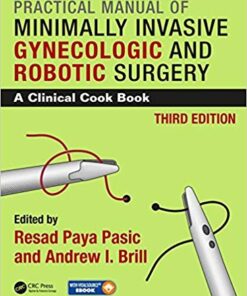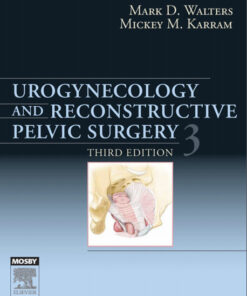Understanding the Benefits of Gynecologic Surgery: What You Need to Know
Learn More About Gynecologic Surgery
Gynecologic surgery is a specialized field of medicine that focuses on the diagnosis and treatment of diseases and conditions related to the female reproductive system. It can involve a variety of procedures, from minimally invasive laparoscopic surgeries to more complex open surgeries. To learn more about gynecologic surgery and the different types of procedures available, visit SurgeryBook.net. Here you will find detailed information about the various types of gynecologic surgeries, as well as information about the risks and benefits associated with each procedure. With this knowledge, you can make an informed decision about your health care needs.
GYNECOLOGIC SURGERY
2022 UCSF Obstetrics and Gynecology Update – What Does The Evidence Tell Us ? (CME VIDEOS)
GYNECOLOGIC SURGERY
Walters & Karram Urogynecology and Reconstructive Pelvic Surgery 5th Edition PDF
GYNECOLOGIC SURGERY
GYNECOLOGIC SURGERY
Atlas of Difficult Gynecological Surgery 1st ed. 2020 Edition PDF
GYNECOLOGIC SURGERY
GYNECOLOGIC SURGERY
Precise Neurovascular Anatomy for Radical Hysterectomy 1st ed. 2020 Edition PDF
GYNECOLOGIC SURGERY
Speroff’s Clinical Gynecologic Endocrinology and Infertility Ninth Edition PDF
GYNECOLOGIC SURGERY
Translational Advances in Gynecologic Cancers 1st Edition PDF
GYNECOLOGIC SURGERY
Pre-Menopause, Menopause and Beyond: Volume 5: Frontiers in Gynecological Endocrinology PDF
GYNECOLOGIC SURGERY
Focus on Gynecologic Malignancies (Energy Balance and Cancer) 1st ed. 2018 Edition PDF
GYNECOLOGIC SURGERY
Textbook of Gynecologic Robotic Surgery 1st ed. 2018 Edition PDF
GYNECOLOGIC SURGERY
GYNECOLOGIC SURGERY
GYNECOLOGIC SURGERY
GYNECOLOGIC SURGERY
Atlas of Vaginal Reconstructive Surgery 1st ed. 2015 EditionPDF
GYNECOLOGIC SURGERY
Operative Techniques in Gynecologic Surgery: Gynecology 1st Edition PDF
GYNECOLOGIC SURGERY
Congenital Mullerian Anomalies 2016 : Diagnosis and Management
GYNECOLOGIC SURGERY
GYNECOLOGIC SURGERY
GYNECOLOGIC SURGERY
Diagnostic and Operative Hysteroscopy 2nd (second) Revised Edition
GYNECOLOGIC SURGERY
A Practical Guide to Office Gynecologic Procedures 2nd ed. Edition
GYNECOLOGIC SURGERY
Introduction
Gynecologic surgery is a specialized field of medicine that focuses on the diagnosis and treatment of conditions related to the female reproductive system. It can be used to treat a variety of issues, from endometriosis to uterine fibroids. Understanding the benefits of gynecologic surgery is essential for women who are considering this type of procedure. This article will provide an overview of the potential benefits of gynecologic surgery, as well as what you need to know before making a decision.
Overview of Gynecologic Surgery: Types, Benefits, and Risks
Gynecologic surgery is a type of medical procedure that focuses on the female reproductive system. It is used to diagnose and treat a variety of conditions, including endometriosis, fibroids, ovarian cysts, pelvic organ prolapse, and uterine cancer. Gynecologic surgery can also be used to perform hysterectomies, tubal ligations, and other procedures related to fertility and contraception.
The types of gynecologic surgery vary depending on the condition being treated. Common types of gynecologic surgery include laparoscopy, hysteroscopy, and robotic-assisted surgery. Laparoscopy is a minimally invasive procedure that uses a thin, lighted tube with a camera attached to it to view the inside of the abdomen and pelvis. Hysteroscopy is a procedure that uses a thin, lighted telescope to view the inside of the uterus. Robotic-assisted surgery is a type of laparoscopic surgery that uses a robotic arm to perform complex surgical tasks.
The benefits of gynecologic surgery are numerous. It can help diagnose and treat a variety of conditions, improve fertility, and reduce the risk of certain cancers. Additionally, many gynecologic surgeries are minimally invasive, meaning they require only small incisions and have a shorter recovery time than traditional open surgery.
As with any medical procedure, there are risks associated with gynecologic surgery. These risks include infection, bleeding, and damage to surrounding organs. Additionally, some gynecologic surgeries may cause scarring or adhesions, which can lead to pain and infertility. It is important to discuss the potential risks and benefits of any gynecologic surgery with your doctor before proceeding.
Overall, gynecologic surgery is a safe and effective way to diagnose and treat a variety of conditions related to the female reproductive system. It can provide relief from symptoms, improve fertility, and reduce the risk of certain cancers. However, it is important to discuss the potential risks and benefits of any gynecologic surgery with your doctor before proceeding.
Preparing for Gynecologic Surgery: What to Expect
Preparing for gynecologic surgery can be a stressful experience, but it is important to understand what to expect before, during, and after the procedure. Knowing what to expect can help you feel more prepared and comfortable with the process.
Before the Surgery
Prior to your surgery, you will likely have an appointment with your doctor to discuss the procedure and any questions or concerns you may have. During this appointment, your doctor will review your medical history and perform a physical exam. You may also need to have blood work done and other tests such as an ultrasound or CT scan.
Your doctor will provide you with instructions on how to prepare for the surgery. This may include fasting for 8-12 hours prior to the procedure, avoiding certain medications, and stopping smoking if you are a smoker. It is important to follow these instructions carefully to ensure the best possible outcome.
During the Surgery
On the day of your surgery, you will arrive at the hospital or surgical center where the procedure will take place. You will be asked to change into a hospital gown and given an IV line for fluids and medication. Depending on the type of procedure, you may receive general anesthesia or local anesthesia.
Once the anesthesia has taken effect, your surgeon will begin the procedure. The length of the surgery will depend on the type of procedure being performed. After the surgery is complete, you will be taken to a recovery room where you will be monitored until you are awake and alert.
After the Surgery
Once you are discharged from the hospital or surgical center, you will need to rest and recover at home. Your doctor will provide you with instructions on how to care for yourself during the recovery period. This may include taking pain medication, avoiding strenuous activities, and getting plenty of rest.
It is important to follow your doctor’s instructions carefully to ensure a successful recovery. You should also make sure to keep all follow-up appointments with your doctor to monitor your progress.
Preparing for gynecologic surgery can be a stressful experience, but understanding what to expect before, during, and after the procedure can help you feel more prepared and comfortable. Following your doctor’s instructions carefully and attending all follow-up appointments can help ensure a successful recovery.
Recovery After Gynecologic Surgery: Tips for a Smooth Healing Process
Recovery after gynecologic surgery can be a difficult process, but with the right preparation and care, you can ensure a smooth healing process. Gynecologic surgery is any type of surgery that involves the female reproductive organs, such as the uterus, ovaries, fallopian tubes, or cervix. It can be used to treat a variety of conditions, including endometriosis, fibroids, ovarian cysts, and cancer.
The recovery period following gynecologic surgery will vary depending on the type of procedure performed and the individual’s overall health. Generally, it takes about four to six weeks for the body to heal completely. During this time, it is important to follow your doctor’s instructions and take steps to ensure a smooth recovery.
One of the most important things you can do to aid in your recovery is to get plenty of rest. This means avoiding strenuous activities and taking frequent breaks throughout the day. You should also avoid lifting heavy objects and engaging in sexual activity until your doctor gives you the green light.
It is also important to eat a healthy diet during your recovery. Eating a balanced diet that includes plenty of fruits, vegetables, lean proteins, and whole grains will help your body heal and provide the nutrients it needs to recover. Additionally, drinking plenty of fluids will help keep your body hydrated and flush out toxins.
Pain management is another key component of recovery after gynecologic surgery. Your doctor may prescribe pain medications to help manage your discomfort. However, it is important to take these medications as directed and not exceed the recommended dosage. Additionally, you may find relief from over-the-counter pain relievers, such as ibuprofen or acetaminophen.
Finally, it is important to follow up with your doctor after your surgery. This will allow them to monitor your progress and make sure that you are healing properly. They may also recommend additional treatments or lifestyle changes to help speed up your recovery.
Recovery after gynecologic surgery can be a challenging process, but with the right preparation and care, you can ensure a smooth healing process. By getting plenty of rest, eating a healthy diet, managing your pain, and following up with your doctor, you can help ensure a successful recovery.
Common Gynecologic Surgeries: Hysterectomy, Endometrial Ablation, and More
A gynecologic surgery is a procedure performed by a gynecologist, a doctor who specializes in women’s reproductive health. Gynecologic surgeries are used to treat a variety of conditions, including endometriosis, uterine fibroids, ovarian cysts, and pelvic organ prolapse. Common gynecologic surgeries include hysterectomy, endometrial ablation, laparoscopy, and myomectomy.
Hysterectomy is the surgical removal of the uterus. It is the most common gynecologic surgery and can be done for a variety of reasons, including cancer, heavy menstrual bleeding, and chronic pelvic pain. Depending on the reason for the surgery, the ovaries and fallopian tubes may also be removed. Hysterectomy is usually done as an outpatient procedure, meaning you will go home the same day.
Endometrial ablation is a procedure that destroys the lining of the uterus. It is used to treat heavy menstrual bleeding and can be done with either a laser or a heated balloon. Endometrial ablation is usually done as an outpatient procedure and does not require anesthesia.
Laparoscopy is a minimally invasive procedure that uses a thin, lighted tube called a laparoscope to look inside the abdomen. It is used to diagnose and treat a variety of conditions, including endometriosis, pelvic inflammatory disease, and ovarian cysts. Laparoscopy is usually done as an outpatient procedure and requires general anesthesia.
Myomectomy is the surgical removal of uterine fibroids. Fibroids are noncancerous growths in the uterus that can cause heavy menstrual bleeding, pelvic pain, and infertility. Myomectomy can be done using either open surgery or laparoscopy. It is usually done as an outpatient procedure and requires general anesthesia.
These are just a few of the common gynecologic surgeries. Your gynecologist can help you decide which procedure is right for you based on your individual needs.
Understanding the Role of Gynecologic Surgery in Women’s Health Care
Gynecologic surgery is an important part of women’s health care. It can help diagnose and treat a variety of conditions, from reproductive issues to cancer. Gynecologic surgery can also be used to improve a woman’s quality of life by providing relief from pain or discomfort.
Gynecologic surgery is typically performed by a gynecologist, a doctor who specializes in the female reproductive system. The most common type of gynecologic surgery is laparoscopy, which uses a thin, lighted tube with a camera attached to it to look inside the abdomen. This procedure is often used to diagnose and treat conditions such as endometriosis, ovarian cysts, fibroids, and pelvic inflammatory disease.
Other types of gynecologic surgery include hysterectomy, which is the removal of the uterus; oophorectomy, which is the removal of one or both ovaries; and tubal ligation, which is the permanent closure of the fallopian tubes. These procedures are usually done to treat conditions such as uterine fibroids, endometriosis, and ovarian cysts. In some cases, they may also be used to prevent pregnancy.
Gynecologic surgery can also be used to treat certain types of cancer, including cervical, ovarian, and endometrial cancers. Surgery may be used to remove tumors or to perform biopsies to determine if cancer is present.
In addition to diagnosing and treating medical conditions, gynecologic surgery can also be used for cosmetic purposes. Procedures such as labiaplasty and vaginoplasty can be used to reshape the external genitalia and improve a woman’s self-confidence.
No matter what type of gynecologic surgery is being performed, it is important that women understand the risks and benefits associated with the procedure. Women should discuss their options with their doctor and make sure they are comfortable with the decision before proceeding. With the right care and attention, gynecologic surgery can be a safe and effective way to improve a woman’s health and quality of life.
Conclusion
Gynecologic surgery can be a beneficial and life-changing experience for many women. It can help to improve overall health, reduce pain, and even prevent certain diseases. It is important to understand the risks and benefits associated with gynecologic surgery before making any decisions. Consulting with a qualified healthcare provider can help you make an informed decision about whether or not this type of surgery is right for you. With the right information and support, gynecologic surgery can be a safe and effective way to improve your quality of






























